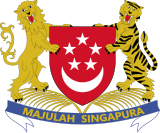
Back سياسة سنغافورة Arabic Палітыка Сінгапура Byelorussian Държавно устройство на Сингапур Bulgarian সিঙ্গাপুর#রাজনীতি Bengali/Bangla Política de Singapur Spanish Singaporen politiikka Finnish Politique à Singapour French सिंगापुर की राजनीति Hindi Politik Singapura ID სინგაპურის პოლიტიკური სისტემა Georgian
| This article is part of a series on |
 |
|---|
|
|
Singapore is a parliamentary representative democratic republic in which the president of Singapore is the head of state, the prime minister of Singapore is the head of government, and of a multi-party system. Executive power is exercised by the Cabinet from the parliament, and to a lesser extent, the president. Cabinet has the general direction and control of the government and is accountable[1] to Parliament. There are three separate branches of government: the legislature, executive and judiciary resembling by the Westminster system.[2] Singapore has been described as being a de facto one-party state.
Legislative power is vested in both the government and the Parliament of Singapore. The legislature is the parliament, which consists of the president as its head and a single chamber whose members are elected by popular vote. The role of the president as the head of state has been, historically, largely ceremonial although the constitution was amended in 1991 to give the president some veto powers in a few key decisions such as the use of the national reserves and the appointment of key judiciary, Civil Service and Singapore Armed Forces posts. They also exercise powers over civil service appointments and national security matters.
- ^ "Our Legal System | Ministry of Law". www.mlaw.gov.sg. Archived from the original on 3 April 2019. Retrieved 29 January 2019.
- ^ "SYSTEM OF GOVERNMENT". 11 November 2020.